Book Chapter

State of the Art About COVID-19’s Impact on Santiago University, Cape Verde
Abstract:
The COVID-19 pandemic has become a critical challenge for the higher education sector worldwide. Under such a circumstance, the exploration of the capacity of this sector to adapt to such a state of uncertainty has become of huge importance. In this chapter, State of the art about COVID-19 impact in Santiago University – Cape Verde, the authors critically reflect on the Cape Verdean teaching experience during the early COVID-19 lockdown. This is an exploratory case study based on a qualitative approach with an aim to reflect on new practices of teaching under a pandemic emergency. Based on the teaching experience of teaching in Santiago University, they explain how this university has changed from a face-to-face to an online teaching system and stress the challenges and opportunities that appear from this transition process. This chapter concludes that this strategy has become an opportunity to the university since it consistently raised the number of international students cooperating with them and also that the more adaptive and resilient approaches to online teaching were also a success.
Quotation:
Sarmento, E., Monteiro, J. (2021). Capítulo 16: State of the art about COVID-19 impact in Santiago University – Cape Verde. In Loureiro, Sandra & Guerreiro, João (eds.) Handbook of Research on Developing a Post-Pandemic Paradigm for Virtual Technologies in Higher Education. ISBN13: 9781799869634; ISBN10: 1799869636. IGI Global (Q2, SJR:0,338)
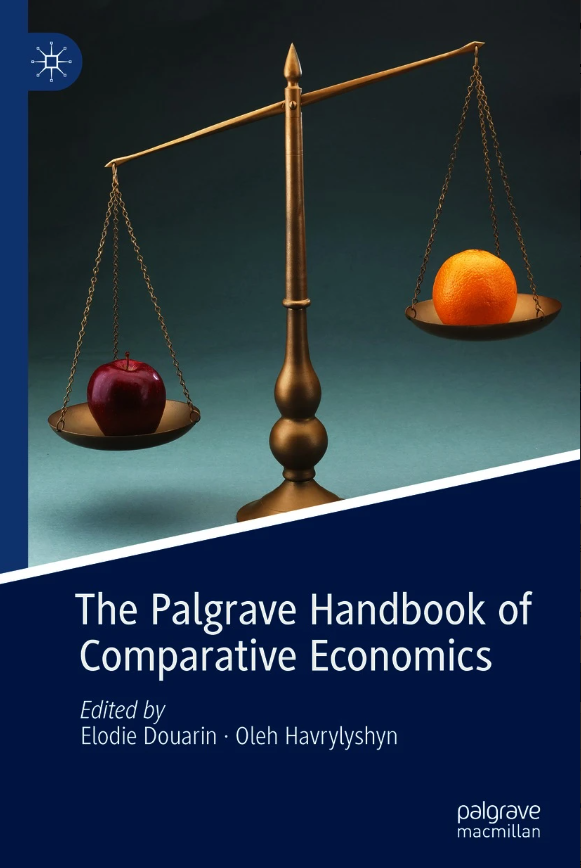
Reform Design Matters: The Role of Structural Policy Complementarities
Abstract:
In this chapter, Reform Design Matters: The Role of Structural Policy Complementarities, we discuss possible interactions across structural policy domains. While relatively more studied in the context of the post-communist transition literature, our survey suggests that relationships of this type hold more generally and can be important to improve our understanding of the relationship between structural reforms and long-run economic growth. Given its potential relevance for the design of successful reform packages, exploring in a more exhaustive way the notion that the effect of a given reform on economic growth depends on the progress made in other policy areas should be a priority point for future research. This may be particularly relevant to help unlock the growth potential of many developing and emerging countries, namely concerning their integration in the global economy. The authors would like to thank Elodie Douarin and Oleh Havrylyshyn for very useful comments on the first draft of this paper. The views expressed in this paper are those of the authors and do not necessarily reflect those of the OECD and its Member countries. Rocha acknowledges financial support from Fundação para a Ciência e Tecnologia (Portugal) through research grant UIDB/05069/2020.
Citação:
Oliveira-Martins, J., da Rocha, B.T. (2021). Reform Design Matters: The Role of Structural Policy Complementarities. In: Douarin, E., Havrylyshyn, O. (eds) The Palgrave Handbook of Comparative Economics. Palgrave Macmillan, Cham. https://doi.org/10.1007/978-3-030-50888-3_19
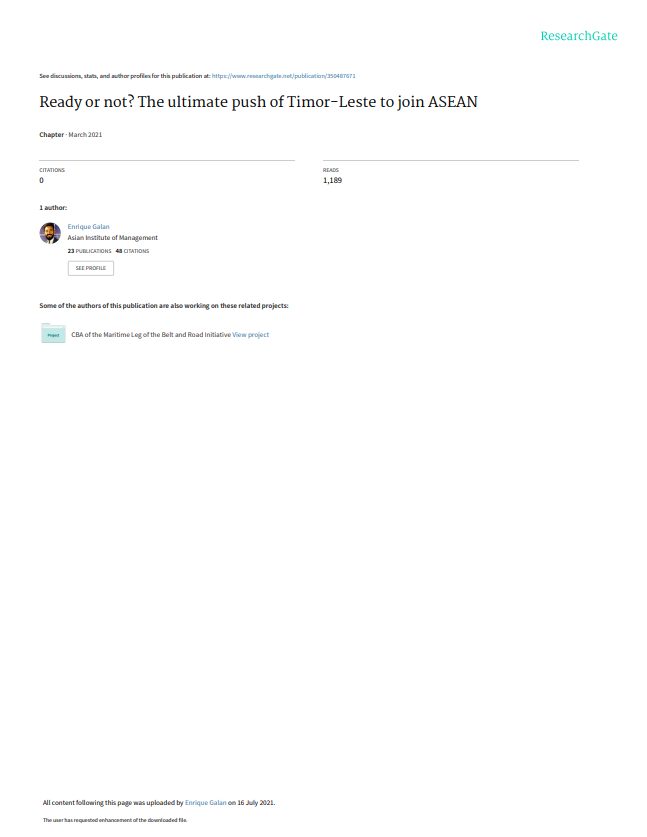
Ready or not? The ultimate push of Timor-Leste to join ASEAN
Abstract:
A persistent concern raised by member states of the Association of South East Asian Nations (ASEAN) is that Timor-Leste’s readiness for membership is not enough, as Dili, the smallest economy in Southeast Asia, may not be able to sign and implement key commitments, nor to participate in all ASEAN institutions and work programmes. Since its formal request for membership in 2011, Timor-Leste has recently stepped up its efforts for ASEAN membership, with the initial technical support of the Japan International Cooperation Agency and, particularly, the enhanced support of the Asian Development Bank. In 2019, there has been a step change in momentum towards accession, with clear ASEAN statements signalling progress in this regard. The first ever ASEAN fact-finding mission to Timor-Leste to assess the country’s potential for membership concluded successfully in September 2019. Two more fact-finding missions are planned for 2020. We assess in this paper Timor-Leste’s readiness for membership in the three pillars of the ASEAN community: economic, socio-cultural, and political security. In Ready or not? The ultimate push of Timor-Leste to join ASEAN, we assess how recent developments address the concerns historically raised by some ASEAN member states about Timor-Leste’s membership. We conclude that the Cambodian and, particularly, the Indonesian presidencies of the ASEAN in 2022 and 2023 could be an important landmark for Timor-Leste’s accession to the Association.
Quotation:
Martínez-Galán, E. (2021). ‘Ready or not? The ultimate push of Timor-Leste to join ASEAN’. Chapter 4B, pp. 405-435 in Leandro, F.J.B.S., dos Santos, P.P. and Li, Y. (eds) China and Portuguese-speaking Small Island States: From sporadic bilateral exchanges to a comprehensive multilateral platform. City University of Macau. Macao. China. ISBN 978-99981-956-3-9
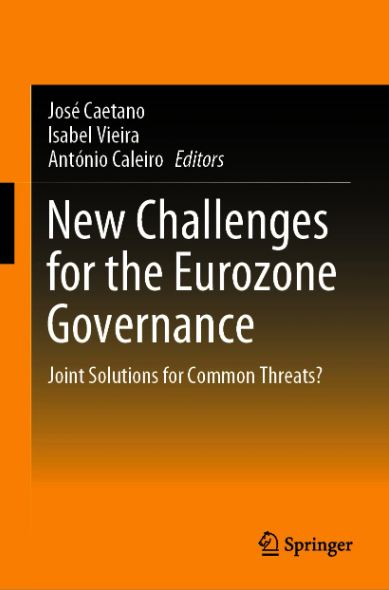
Europe at the crossroads of the COVID-19 crisis: integrated macroeconomic policy solutions for an asymmetric area
Abstract:
The economic crisis triggered by the COVID–19 pandemic once again raises doubts about the eurozone’s ability to deal with joint economic problems given its dissimilar dynamics and asymmetries. Europe at the crossroads of the COVID-19 crisis: integrated macroeconomic policy solutions for an asymmetric area contributes to a paradigm shift in the governance of the euro area towards a more comprehensive and integrated approach. Two dimensions of this paradigm are considered. First, the need for a change in the economic policy concerning the recovery, from a supply-push to a demand-pull orientation, supported on a fiscal and monetary policy mix, integrated within a comprehensive macroeconomic approach. Second, we examine the need for a shift in external relations towards a more global integration-oriented policy, with the euro area positioning itself as an alternative to the current polarization between the United States and China. Our conclusions point to: (i) giving priority to growth and employment; (ii) promoting long-term economic sustainability based on integrated macroeconomic policies, the reduction of income concentration, and the reconstitution of strong middle classes; (iii) reorientating international relations into a perspective of cooperation; (iv) reinforcing regulation and global governance; and (v) eliminating exceptional situations and ways to evade economic controls.
Quotation:
“Mendonça, A. and Vale, S. (forthcoming). “Europe at the crossroads of the COVID-19 crisis: integrated macroeconomic policy solutions for an asymmetric area”, (co-autoria com Vale, S.), in New challenges for Eurozone Governance: Are there joint solutions for common threats? (Edit. José Caetano, Isabel Vieira, and António Caleiro), London: Springer. ISBN-10:3030623718″
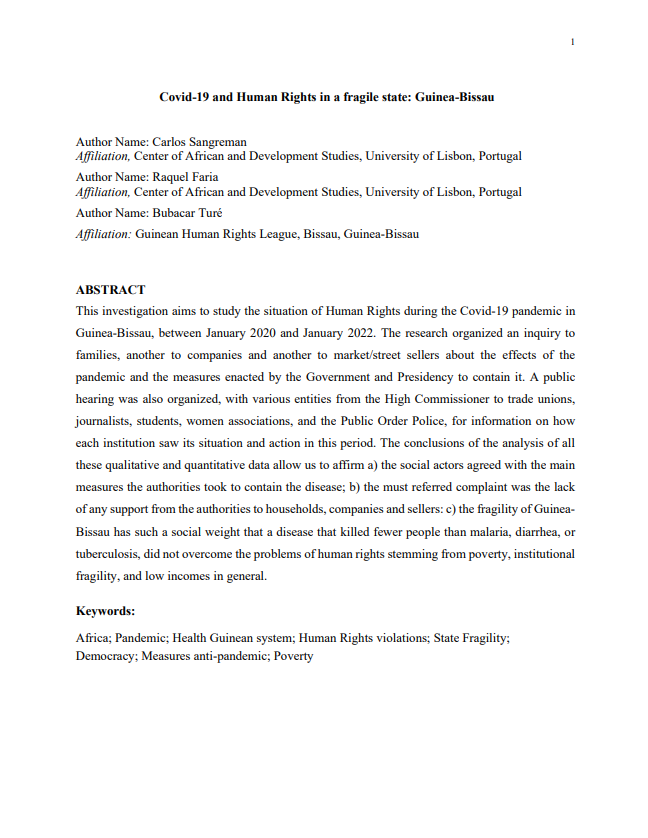
COVID-19 and Human Rights in a Fragile State: Guinea-Bissau
Abstract:
COVID-19 and Human Rights in a Fragile State: Guinea-Bissau aims to study the situation of Human Rights during the Covid-19 pandemic in Guinea-Bissau, between January 2020 and January 2022. The research organized an inquiry to families, another to companies and another to market/street sellers about the effects of the pandemic and the measures enacted by the Government and Presidency to contain it. A public hearing was also organized, with various entities from the High Commissioner to trade unions, journalists, students, women associations, and the Public Order Police, for information on how each institution saw its situation and action in this period. The conclusions of the analysis of all these qualitative and quantitative data allow us to affirm a) the social actors agreed with the main measures the authorities took to contain the disease; b) the must referred complaint was the lack of any support from the authorities to households, companies and sellers: c) the fragility of Guinea-Bissau has such a social weight that a disease that killed fewer people than malaria, diarrhea, or tuberculosis, did not overcome the problems of human rights stemming from poverty, institutional fragility, and low incomes in general.
Quotation:
Sangreman, C., Faria, R. T., & Turé, B. (2022). COVID-19 and Human Rights in a Fragile State: Guinea-Bissau. In P. Andrade, & M. Martins (Ed.), Handbook of Research on Urban Tourism, Viral Society, and the Impact of the COVID-19 Pandemic (pp. 341-360). IGI Global. https://doi.org/10.4018/978-1-6684-3369-0.ch018
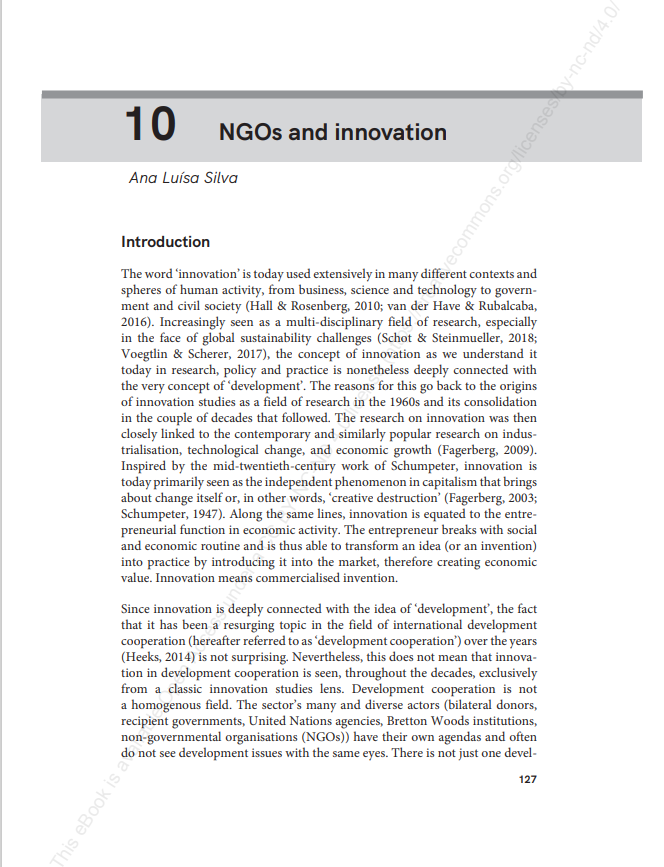
NGOs and Innovation
Abstract:
Over the past twenty years, and against the backdrop of a profound transformation in the international development cooperation sector, innovation has resurged as a ‘hot’ topic in the field. In the same period, development non-governmental organisations (NGOs) face growing challenges of legitimacy, accountability, and dependence on government funding. Their role as precursors of alternative development models, natural social innovators, and catalysts of international solidarity movements is increasingly being questioned. These challenges have been further exacerbated by the Covid-19 pandemic. Existing research on development NGO innovation focuses, like most classic innovation research in other fields, on studying specific, usually successful, innovations; leaving many questions unanswered on topics like innovation failure, processes, culture, funding, motivations, as well as the role of NGOs in innovation for development. This chapter, NGOs and Innovation, by Ana Luísa Silva, gives an overview of the state of the art on development NGOs and innovation, identifying areas that are open for further research. This article is inserted in A Research Agenda for Civil Society, a book by Kees Biekart and Alan Fowler.
Quotation:
Silva, A. L. (2022). NGOs and Innovation. In K. Biekart & A. Fowler (Ed.), A Research Agenda for Civil Society (pp. 127-142). Elgar Research Agendas. Edward Elgar. ISBN: 978 1 80037 814 8
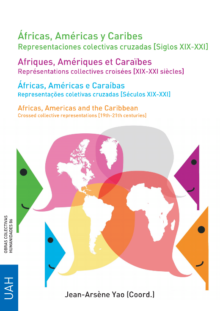
As (im) pertinências do método. Metodologia participativa e o estudo sobre a Afrodescendência em Portugal
Abstract:
The announcement of the Decade of African Descendants (2015-2024) by the UN, drew attention to the presence of African descendants in Europe, including in Portugal, as part of the contemporary social configuration of the continent. However, the focus on these people has been sustained, above all, in theories and representations of subalternity and exclusion that do not recognize them as new political subjects in a Europe that is no longer black and white. These politically hybrid subjects, in the historical and cultural sense, bring theoretical-epistemological and methodological challenges to the social sciences, since their visions, paradigms and ways of living escape the traditional lenses of the approaches that associate them with immigrants or refugees. We propose that in approaching the subject of Afrodescendence, method is central and determinant of the outcomes, ethical function and meaning of social research on emerging contemporary subjects. We argue in favour of participatory methodology, reflecting on its pertinence in a context where the people in the researched situation are critical subjects in their fields of intervention/action who reject being reduced to mere objects of study. We analyse the processes of negotiation in the field concluding on the contribution of this project to the dialogue between academics and the afrodescendant collectives. As (im)pertinências do método. Metodologia participativa e o estudo sobre a Afrodescendência em Portugal is inserted in the debate on the democratization of knowledge, sustained, in particular, by critical perspectives that are based on studies on emerging contemporary subjects.
Quotation:
Évora, Iolanda. “As (im)pertinências do método. Metodologia participativa e o estudo sobre a Afrodescendência em Portugal”, In: Yao, Jean-Arséne, Victorien Lavou Zoungbo et Luis Mancha San Esteban, eds. Forthcoming. Representations collectives croisées: Afriques, Amériques et Caraibes. Xix-xxi siècles. III GRELAT. Actas do Colóquio. Madrid: UAH Editora, 167-176. ISBN:978-84-18254-12-3.
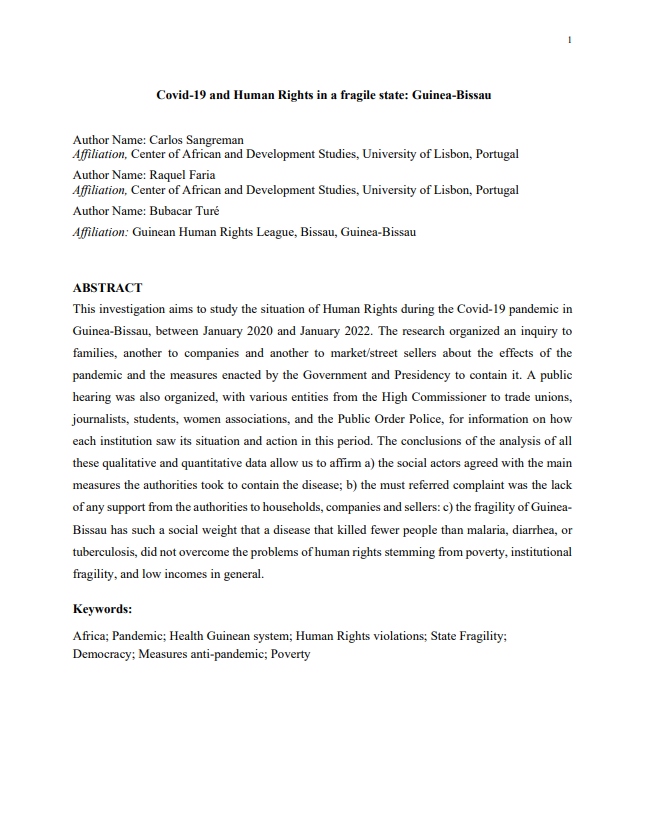
Covid-19 and Human Rights in a fragile state : Guinea-Bissau
Abstract:
COVID-19 and Human Rights in a Fragile State: Guinea-Bissau aims to study the situation of Human Rights during the Covid-19 pandemic in Guinea-Bissau, between January 2020 and January 2022. The research organized an inquiry to families, another to companies and another to market/street sellers about the effects of the pandemic and the measures enacted by the Government and Presidency to contain it. A public hearing was also organized, with various entities from the High Commissioner to trade unions, journalists, students, women associations, and the Public Order Police, for information on how each institution saw its situation and action in this period. The conclusions of the analysis of all these qualitative and quantitative data allow us to affirm a) the social actors agreed with the main measures the authorities took to contain the disease; b) the must referred complaint was the lack of any support from the authorities to households, companies and sellers: c) the fragility of Guinea-Bissau has such a social weight that a disease that killed fewer people than malaria, diarrhea, or tuberculosis, did not overcome the problems of human rights stemming from poverty, institutional fragility, and low incomes in general.
Quotation:
Sangreman, C., Faria, R. T., & Turé, B. (2022). COVID-19 and Human Rights in a Fragile State: Guinea-Bissau. In P. Andrade, & M. Martins (Ed.), Handbook of Research on Urban Tourism, Viral Society, and the Impact of the COVID-19 Pandemic (pp. 341-360). IGI Global. https://doi.org/10.4018/978-1-6684-3369-0.ch018
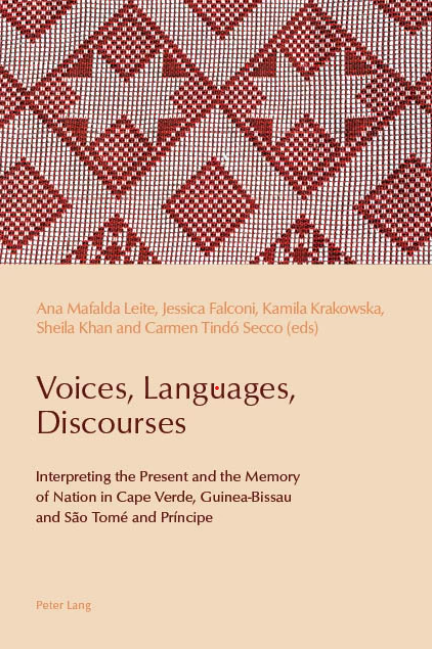
Voices, Languages, Discourses: Interpreting the present and the memory of Nation in Cape Verde, Guinea-Bissau and São Tomé and Príncipe
Abstract:
Voices, Languages, Discourses: Interpreting the Present and the Memory of Nation in Cape Verde, Guinea-Bissau and São Tomé and Príncipe brings together a selection of interviews with writers and filmmakers from Cape Verde, Guinea-Bissau and São Tomé and Príncipe in order to examine representations and images of national identity in these countries’ postcolonial narratives. It continues and completes the exploration of the postcolonial imaginary and identity of Portuguese-speaking Africa presented in the previous interview volume Speaking the Postcolonial Nation: Interviews with Writers from Angola and Mozambique (2014). Memory, history, migration and diaspora are central notions in the recreation and reconceptualisation of the nation and its identities in Cape Verdean, Guinean and São Tomense literary and film culture. By bringing together different generations of writers and filmmakers, with a wide variety of perspectives on the historical, social and cultural changes that occurred in their countries, this book makes a valuable contribution to current debates on post-colonialism, nation and identity in these former Portuguese colonies.
Quotation:
Leite, A., M., Falconi, J., Krakowska, K., Kahn, S., Secco, C. (2020). Voices, Languages, Discourses: Interpreting the Present and the Memory of Nation in Cape Verde, Guinea-Bissau and São Tomé and Príncipe. Oxford, United Kingdom: Peter Lang Verlag. Retrieved Oct 6, 2022, from https://www.peterlang.com/document/1055586
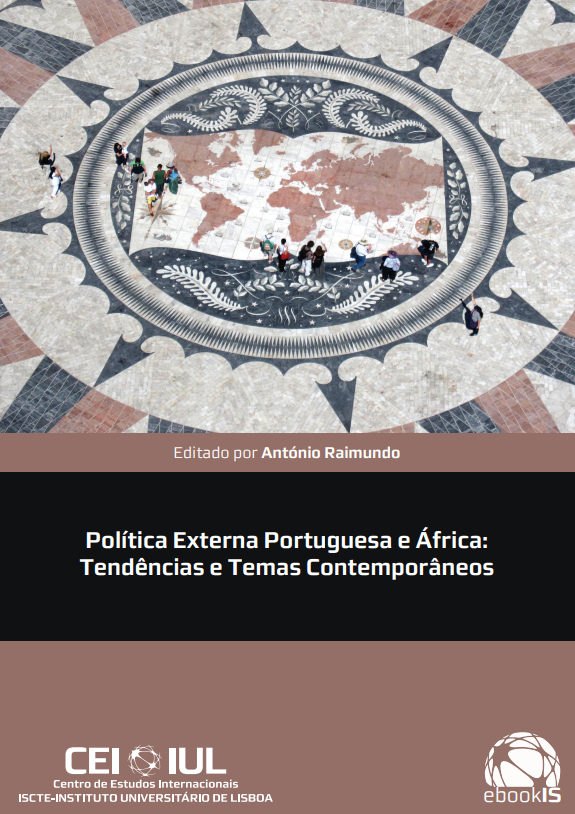
Portugal e o Bazar Africano: Mapeando trocas comerciais, fluxos de investimento e de ajuda ao desenvolvimento
Abstract:
Authored by Luís Mah, Portugal e o bazar africano: Mapeando trocas comerciais, fluxos de investimento e de ajuda ao desenvolvimento (with Rodrigo Ferreira do Amaral and Tcherno Baldé) is the fifth chapter of the e-book “Política Externa Portuguesa e África: Contextos e Tendências Contemporâneo” by A, Raimundo. In recent decades, Africa has gone from a ‘hopeless’ continent to an attractive and potential frontier market. The rapid economic changes in the region have benefited from new patterns of global engagement, involving emerging economies such as China or India. These developments have promoted increasing South-South cooperation, with several African countries seeking greater integration into the world economy. This chapter begins by analysing the current African economic context. Next, it explores how Portugal has developed its economic presence and cooperation on the continent since the mid-1970s, considering three indicators: trade, investment and development aid. Finally, the article assesses the challenges and opportunities for Portugal’s economic relations with Sub-Saharan Africa.
Quotation:
Mah, Luís (2019). Portugal e o bazar africano: Mapeando trocas comerciais, fluxos de investimento e de ajuda ao desenvolvimento (com Rodrigo Ferreira do Amaral e Tcherno Baldé) Em Política Externa Portuguesa e África: Contextos e Tendências Contemporâneo editado por António Raimundo, Lisboa: Centro de Estudos Internacionais, ISCTE-Instituto Universitário de Lisboa. ISBN 978-989-781-168-5. Cap. 5. pp. 121-139.





